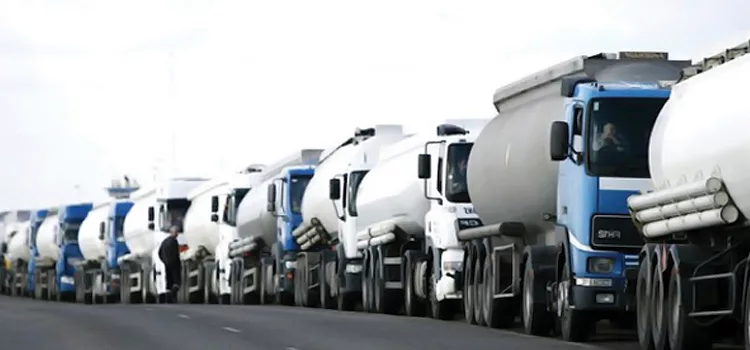The federal government has banned fuel tankers with a 60,000 litres capacity from loading and transporting petroleum products from the various depots across the country, effective from March 1, 2025.
Also, by the fourth quarter of 2025, the transportation of petroleum in trucks exceeding 45,000 litres will also be prohibited.
This move comes after a series of tragic tanker explosions, which have claimed numerous lives and caused significant property damage. In a meeting held on Wednesday with key industry stakeholders, the NMDPRA outlined these measures as the first step in tackling the ongoing safety crisis.
Chief executive of the Nigerian Midstream and Downstream Petroleum Regulatory Authority (NMDPRA) Farouk Ahmed, who announced the ban, said this is part of the measures taken by the federal government to curtail the incidences of tanker explosions and fires in the country, following a series of tragic explosions that have claimed numerous lives.
Recall that in January 2025 alone, over 100 lives were lost in tanker-related accidents. The most devastating incident occurred on January 18 when a petrol tanker exploded at Dikko junction along the Abuja-Kaduna expressway in Niger State, resulting in the deaths of at least 98 people. The explosion happened when local residents attempted to scoop fuel from the overturned tanker after an accident. The resulting fire left dozens of people severely burned.
A week later, another explosion occurred along the Enugu-Onitsha Expressway, killing 11 individuals. In this case, a tanker suffered brake failure, toppled, and leaked fuel, which ignited and caused a deadly blaze.
Available data revealed that nearly 493 fatalities have occurred from tanker-related incidents over the past three years, with 121 deaths already reported in just the first two months of 2025 alone.
Ahmed, who was represented by executive director, Distribution, Systems, Storage and Retailing Infrastructure, Ogbugo Ukoha, during a news briefing in Abuja, on Wednesday, also said the ban will extend the loading or transportation of petroleum products on any truck in excess of 45,000 litres by the fourth quarter of 2025.
“The breaking news from today today’s meeting comprising DSS, FEMA, Federal Fire Service, Road Safety, NATO, NUPENG, MEMAN, PETROAN, IPMAN, DAPMAN, SON, ONSA, is that beginning 1st March, any truck with an axle load that is carrying more than 60,000 litres of hydrocarbon will not be allowed to load at any loading depot.
“Let me repeat that again. Beginning 1st March, trucks with a capacity in excess of 60,000 litres will not be allowed to load in any loading depot for petroleum products.
“By Q4 of 2025, we will also preclude the loading or transportation of petroleum products on any truck in excess of 45,000 litres. So that is the breaking news for today.
“This is just one out of ten measures that stakeholders have agreed that need to be addressed if we want to mitigate the high level of trucks in transit accidents.
“The important thing about this is that for the first time consensus was built amongst all stakeholders and we are continuing to encourage that we work together cohesively to deliver a safe transportation of petroleum products across the country, “ Ahmed said.
The NMDPRA also confirmed that the Nigerian National Petroleum Company Limited (NNPC) has not imported the Premium Motor Spirit (PMS) petrol this year.
The confirmation came over the news reports that the state-owned oil firm imported PMS burns faster than that of Dangote Refinery.
The NMDPRA said all the petroleum products imported to the country this year are of standard quality.
It recalled after the removal of subsidy on petrol, national consumption of the product declined from an average of 66 million litre (ml/d) to 50 ml/d.
According to him, less than 60 per cent of the national consumption is met from domestic refineries while the shortfall is imported by Oil Marketing Companies (OMCs).
He explained that the contribution of local refineries has been less than a 60 per cent shortfall in January and February 2025.
The executive director said 50 per cent of the shortfall is sourced from importation.
He however specifically noted that none of the OMCs that owned refineries have imported petroleum products this year.
“So just for clarity, what I am saying is that the contribution of local refining towards the sufficiency is less than 60 per cent currently. January and February 2025 is less than 50 of what we require daily. And that shortfall is sourced by way of importation. Even though none of the OMCs that owned refineries have imported PMS this year.”
On quality, he said the NMDPRA always insists that all petroleum products meet the specifications of the Standard Organization of Nigeria (SON) and the Petroleum Industry Act (PIA) 2021.
According to him, the Authority does not permit the distribution of products that fall short of quality standards.
“You must meet those specifications, otherwise we will not let those products be distributed,” he said.
He said some people have been releasing bogus claims concerning product quality on social media.
He said, “Finally, let me just say a word about what the responsibility we all bear. The regulator will usually be more circumspect and not run, chase, or respond to every comment that is made by the public.
”But it is important that people who dabble within the social media space are reminded that it is disrespectful if you imagine that Nigerians are gullible.
“Innocent Nigerians are discerning enough to know that energies need to be directed positively. So people who make unscientific claims, that make bogus data expertise claims of that, are really not helping the situation.
“As a regulator, we are working very hard in compliance with the presidential and statutory mandates we have to support the local refineries to build capacity to the point that Nigerians will have sufficient products and not just quality but pricing is also done in a transparent, competitive and fair way.”



